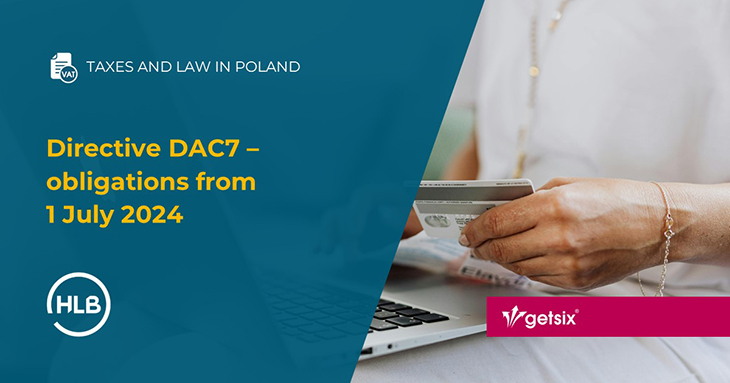Directive DAC7 – obligations from 1 July 2024
We would like to remind you that as of 1 July 2024, the provisions of European Union Directive No. 2021/1194 of 7 July 2021 (hereinafter “DAC7”) have come into force in Poland. These impose new reporting obligations on operators of digital platforms through which goods and services are offered.
On 11 June 2024, the President signed a law amending the Act on Exchange of Tax Information with Other Countries and Certain Other Acts, which implements Directive DAC7.
What reporting obligations await operators of digital platforms?
- Collecting data on sellers: Digital platforms will need to collect detailed information about sellers conducting transactions through their platforms. They will also be required to record the number and value of these transactions.
- Reporting information to tax authorities: Platforms must annually transmit the collected data to the Head of the National Tax Administration (KAS). This information include seller data and transaction details conducted through the platform.
- Verification procedures: Platforms will be obliged to adhere to verification procedures, including checking the identity, tax residence of sellers, and the reliability of the information provided by them. These procedures aim to ensure that the data transmitted to tax authorities is accurate and complete.
- Measures in case of non-compliance: If a seller fails to provide required information, the platform will issue appropriate warnings. After two warnings and continued non-compliance, the platform will be required to withhold payment for sales or block the seller’s account.
It is important to note that platforms are required to verify their reporting obligations and report data for reporting periods from 1 January 2023 onwards.
DAC7 also introduces severe penalties for non-compliance with these new obligations. Individuals representing operators of digital platforms who fail to fulfil their obligations regarding information reporting and due diligence procedures may face fines of up to 180 daily rates, which could run up easily to an amount exceeding PLN 10 million.
What do the changes mean for sellers?
Information submitted by operators of digital platforms may be used by tax authorities to verify whether a seller’s activity on a sales platform constitutes business activity under tax regulations.
Potential consequences for sellers:
- Taxation: Tax authorities may classify a seller’s activity as business activity, which entails obligations such as tax registration, bookkeeping, payment of personal income tax (PIT), and contributions to social insurance (ZUS).
- Additional obligations: Business activity may also trigger obligations to pay value-added tax (VAT).
- Sanctions: Conducting business activity without registration and fulfilling tax obligations may result in financial penalties.
Important considerations:
- Private sales: The sale of personal items does not constitute business activity, even if conducted through sales platforms (after six months from acquisition, the sale of goods is exempt from taxation, provided it is not conducted within a business activity).
- Individual assessment: Tax authorities evaluate each case individually, considering factors such as transaction frequency, value, nature of goods sold, and the manner of conducting business.
In case of doubts regarding the classification of activities or tax obligations, it is advisable to consult a tax advisor.
Summary
Directive DAC7 introduces significant changes in the scope of reporting obligations for digital platforms, indirectly impacting sellers operating online.
The new provisions do not alter existing taxation rules for individuals selling through digital platforms. The data collected by tax authorities aim to reduce tax evasion in the digital space, thereby restoring competitive balance. Individuals concerned about tax scrutiny may consider the option of operating without a formal registration, destined for those whose monthly revenues do not exceed 75% of the minimum wage. However, it is crucial to note that even in such cases, income must be declared and taxed under personal income tax rules (PIT).
For more information on Directive DAC7, please refer to the post: New draft law implementing Directive DAC7.
If you have any questions regarding this topic or if you are in need for any additional information – please do not hesitate to contact us:
CUSTOMER RELATIONSHIPS DEPARTMENT

ELŻBIETA NARON
Head of Customer Relationships
Department / Senior Manager
getsix® Group
***





